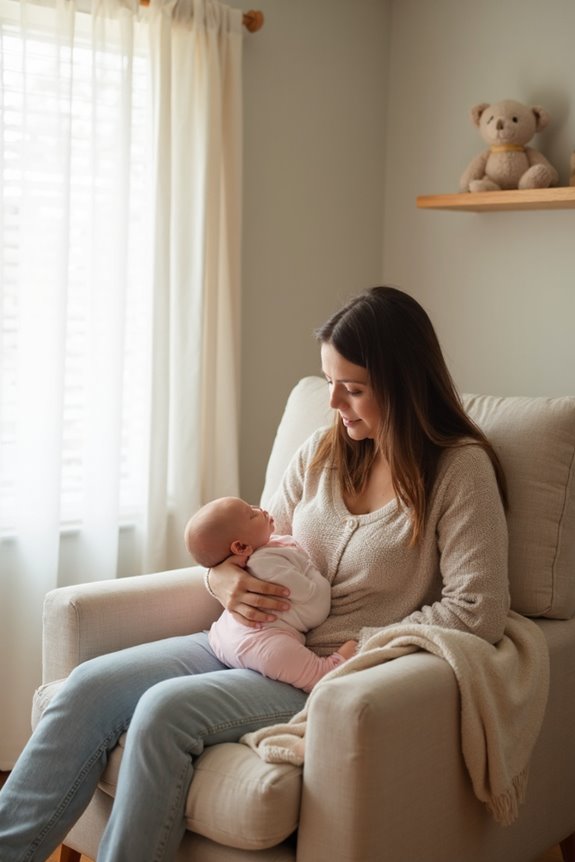We burp babies to ensure they’re comfortable by releasing swallowed air after feeding. This helps prevent fussiness and possible regurgitation, though sometimes burping might increase spit-up incidents. Essential techniques include gently patting your baby’s back over your shoulder, sitting them upright, or laying them face down on your lap. While burping might not prevent colic, it does ease digestive discomfort. Explore more recommendations to gain a broader understanding and support your parenting journey.
Key Takeaways
- Burping helps release swallowed air, preventing discomfort and reducing fussiness in babies.
- Traditional burping methods include over-the-shoulder and upright positions with gentle patting.
- There is mixed evidence on burping’s effectiveness in preventing colic and regurgitation.
- Placing a towel under the baby’s chin can catch any spit-up during burping.
- Online parenting communities provide support and advice on mastering burping techniques.
The Purpose of Burping Babies
When it comes to feeding our babies, one question often arises: why do we burp them? It’s about ensuring comfort by releasing swallowed air, which can prevent fussiness and reduce spit-up. However, let’s not forget burping myths and cultural practices. Historically, burping has been a comforting ritual, a practice passed down through generations, despite the lack of strong scientific backing.
While pediatricians have long advised it, research shows mixed results. Some studies suggest burping increases regurgitation rather than decreasing it. Yet, the action itself can feel reassuring, showing our attentiveness to our child’s needs. We must consider:
- Air Removal: Helps reduce discomfort.
- Cultural Practices: Offers a sense of tradition.
- Mixed Evidence: Continually evolving, requiring discernment.
Mastering Burping Techniques

Mastering the art of burping a baby is something we all strive to achieve, as it combines traditional wisdom with practical techniques. Let’s explore effective burping methods for baby comfort.
- Burping Positions: Try the over-the-shoulder method where gentle pats coax a burp, or sit your baby upright on your lap with chin support. Face down on your lap works too, but ensure they’re comfortable.
- Gentle Patting: Use a cupped hand to softly pat their back, applying gentle pressure to release trapped air.
- Preventing Mess: A towel under the chin can catch any spit-up, ensuring cleanliness.
- Timing: Burp them after feeding, ideally after an ounce or two, to maximize comfort.
Patience and flexibility are key, so switch positions if needed.
Understanding the Burping and Colic Connection

Though burping is a common practice in infant care, its impact on colic is still a topic of debate among parents and healthcare professionals. We’ve all heard the burping myths, suggesting it prevents colic symptoms, but research tells a different story. Studies, including randomized trials, show little evidence that burping significantly reduces colic episodes. In fact, some findings indicate that burping might increase regurgitation.
- Colic and Burping:
- Colic symptoms: Excessive crying, abdominal discomfort.
- Burping myths: Often believed to prevent colic, but lacks supporting evidence.
- What We Know:
- Pediatricians recommend consulting them for digestive health concerns.
- Other soothing methods: Swaddling, rocking, may offer more comfort.
In the end, let’s focus on what truly eases our little ones.
Exploring Burping and Regurgitation Dynamics

As we delve into the dynamics of burping and regurgitation, it’s important to understand how these mechanisms work together and affect our little ones. Burping benefits our babies by allowing them to expel swallowed air, which is crucial for comfort and digestive health. When we pat their backs, it helps release trapped air, reducing pain and distress.
However, studies reveal that burping can sometimes increase regurgitation episodes. This occurs because the release of trapped air may prompt regurgitation, indicating possible digestive discomfort or a reaction to air intake.
- Burping Benefits: Reduces trapped air, enhances comfort.
- Regurgitation Causes: Air release may lead to episodes.
Guidance and Support for New Parents

When stepping into the world of parenting, it’s crucial to know where to find guidance and support, especially for new parents navigating the early challenges. We can lean on parenting resources like online communities, such as The Bump, which offer a wealth of advice and shared experiences. These forums become vital lifelines, helping us address child care challenges and access expert predictions on emerging parenting trends.
As we face financial burdens, such as high child care costs, and navigate cultural awareness, online communities provide a platform for shared understanding and support. They connect us with others who share similar struggles, ensuring we don’t feel alone. By tapping into these resources, we stay informed on state data and policy solutions, enhancing family well-being and stability.
Frequently Asked Questions
How Long Should Each Burping Session Last?
Let’s ensure our baby’s comfort by using gentle burping techniques. Each session should last 5 to 15 minutes. If there’s no burp after a few minutes, it’s okay to stop and try another method.
Can Certain Foods in My Diet Affect My Baby’s Gas?
Yes, certain foods in our diet can affect our baby’s gas. Dietary impacts, like high FODMAP foods, may lead to discomfort. Focusing on balanced meals aids baby digestion, easing gas and fostering a happier little one.
Are There Alternative Methods to Relieve Baby’s Gas Besides Burping?
We know burping isn’t the only way to help with gas. Let’s try gas relief techniques like baby massage. Gently rubbing their tummy or using leg movements can work wonders, creating soothing moments for both of us.
Do Formula-Fed Babies Need More Frequent Burping Than Breastfed Babies?
We might burp formula-fed babies more frequently due to formula’s harder digestion. Using effective burping techniques and mindful feeding positions, we can help ease discomfort. Let’s share our experiences and create nurturing routines together.
What Signs Indicate My Baby Doesn’t Need Burping?
We know our baby might not need burping if they’re content after feeding and can sit or roll. Observing their comfort and feeding positions helps determine if they’ve outgrown the need for burping.





